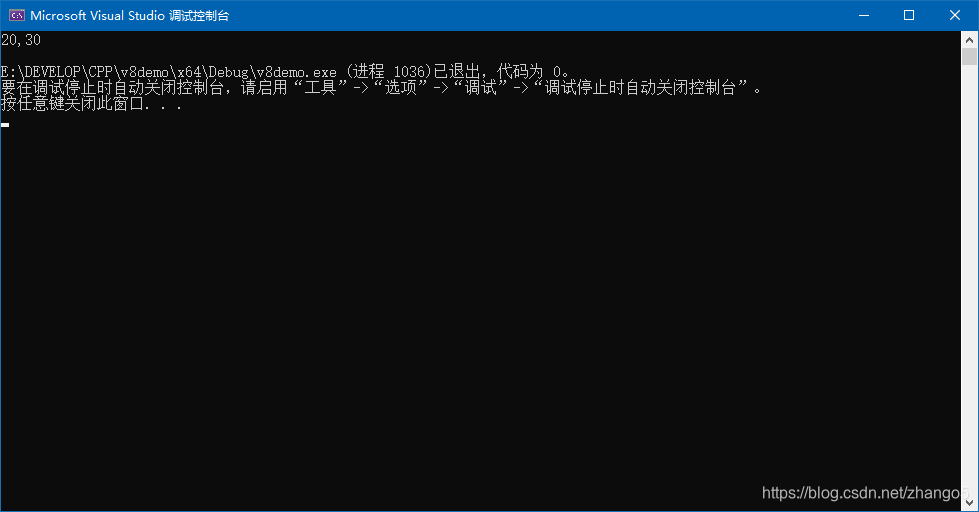????????参考《Getting started with embedding V8 · V8》
Accessing dynamic variables
首先,创建Point类
class Point
{
public:
Point( int x, int y ) : x_( x ), y_( y ) { }
int x_, y_;
};其次,编写Point类的创建函数:
// point constructor
void PointConstructor( const v8::FunctionCallbackInfo<v8::Value>& info ) {
v8::Handle<v8::Object> object = info.This();
v8::HandleScope handle_scope( info.GetIsolate() );
int x = info[0]->Int32Value( info.GetIsolate()->GetCurrentContext() ).ToChecked();
int y = info[1]->Int32Value( info.GetIsolate()->GetCurrentContext() ).ToChecked();
Point* pt = new Point( x, y );
object->SetInternalField( 0, v8::External::New( info.GetIsolate(), pt ) );
info.GetReturnValue().Set( object );
}定义属性x、y的方法:
// getter setter
void GetX( const v8::FunctionCallbackInfo<v8::Value>& info ) {
v8::Local<v8::Object> self = info.Holder();
v8::Local<v8::External> wrap = v8::Local<v8::External>::Cast( self->GetInternalField( 0 ) );
void* ptr = wrap->Value();
info.GetReturnValue().Set( v8::Integer::New( info.GetIsolate(), static_cast<Point*>(ptr)->x_ ) );
}
void SetX( const v8::FunctionCallbackInfo<v8::Value>& info ) {
v8::Local<v8::Object> self = info.Holder();
v8::Local<v8::External> wrap = v8::Local<v8::External>::Cast( self->GetInternalField( 0 ) );
void* ptr = wrap->Value();
static_cast<Point*>(ptr)->x_ = info[0]->Int32Value( info.GetIsolate()->GetCurrentContext() ).ToChecked();
}
void GetY( const v8::FunctionCallbackInfo<v8::Value>& info ) {
v8::Local<v8::Object> self = info.Holder();
v8::Local<v8::External> wrap = v8::Local<v8::External>::Cast( self->GetInternalField( 0 ) );
void* ptr = wrap->Value();
info.GetReturnValue().Set( v8::Integer::New( info.GetIsolate(), static_cast<Point*>(ptr)->y_ ) );
}
void SetY( const v8::FunctionCallbackInfo<v8::Value>& info ) {
v8::Local<v8::Object> self = info.Holder();
v8::Local<v8::External> wrap = v8::Local<v8::External>::Cast( self->GetInternalField( 0 ) );
void* ptr = wrap->Value();
static_cast<Point*>(ptr)->y_ = info[0]->Int32Value( info.GetIsolate()->GetCurrentContext() ).ToChecked();
}声明Point类在js文件中访问的名称,以及get、set方法名称:
v8::Local<v8::ObjectTemplate> global = v8::ObjectTemplate::New( isolate );
v8::Handle<v8::FunctionTemplate> pt_temp = v8::FunctionTemplate::New( isolate, PointConstructor );
pt_temp->SetClassName( v8::String::NewFromUtf8( isolate, "Point" ).ToLocalChecked() );
global->Set( v8::String::NewFromUtf8( isolate, "Point" ).ToLocalChecked(), pt_temp );
v8::Handle<v8::ObjectTemplate> pt_proto = pt_temp->PrototypeTemplate();
pt_proto->Set( isolate, "GetX", FunctionTemplate::New( isolate, GetX ) );
pt_proto->Set( isolate, "SetX", FunctionTemplate::New( isolate, SetX ) );
pt_proto->Set( isolate, "GetY", FunctionTemplate::New( isolate, GetY ) );
pt_proto->Set( isolate, "SetY", FunctionTemplate::New( isolate, SetY ) );pt_temp->InstanceTemplate()->SetInternalFieldCount( 1 );这样就可以在js文件中创建Point对象,通过get、set访问对象属性了。
main.cpp
// Copyright 2015 the V8 project authors. All rights reserved.
// Use of this source code is governed by a BSD-style license that can be
// found in the LICENSE file.
#include <stdio.h>
#include <stdlib.h>
#include <string.h>
#include "include/libplatform/libplatform.h"
#include "include/v8.h"
#include "point.h"
using namespace std;
using namespace v8;
const std::string fileName = "file.js";
// point constructor
void PointConstructor( const v8::FunctionCallbackInfo<v8::Value>& info ) {
v8::Handle<v8::Object> object = info.This();
v8::HandleScope handle_scope( info.GetIsolate() );
int x = info[0]->Int32Value( info.GetIsolate()->GetCurrentContext() ).ToChecked();
int y = info[1]->Int32Value( info.GetIsolate()->GetCurrentContext() ).ToChecked();
Point* pt = new Point( x, y );
object->SetInternalField( 0, v8::External::New( info.GetIsolate(), pt ) );
info.GetReturnValue().Set( object );
}
// getter setter
void GetX( const v8::FunctionCallbackInfo<v8::Value>& info ) {
v8::Local<v8::Object> self = info.Holder();
v8::Local<v8::External> wrap = v8::Local<v8::External>::Cast( self->GetInternalField( 0 ) );
void* ptr = wrap->Value();
info.GetReturnValue().Set( v8::Integer::New( info.GetIsolate(), static_cast<Point*>(ptr)->x_ ) );
}
void SetX( const v8::FunctionCallbackInfo<v8::Value>& info ) {
v8::Local<v8::Object> self = info.Holder();
v8::Local<v8::External> wrap = v8::Local<v8::External>::Cast( self->GetInternalField( 0 ) );
void* ptr = wrap->Value();
static_cast<Point*>(ptr)->x_ = info[0]->Int32Value( info.GetIsolate()->GetCurrentContext() ).ToChecked();
}
void GetY( const v8::FunctionCallbackInfo<v8::Value>& info ) {
v8::Local<v8::Object> self = info.Holder();
v8::Local<v8::External> wrap = v8::Local<v8::External>::Cast( self->GetInternalField( 0 ) );
void* ptr = wrap->Value();
info.GetReturnValue().Set( v8::Integer::New( info.GetIsolate(), static_cast<Point*>(ptr)->y_ ) );
}
void SetY( const v8::FunctionCallbackInfo<v8::Value>& info ) {
v8::Local<v8::Object> self = info.Holder();
v8::Local<v8::External> wrap = v8::Local<v8::External>::Cast( self->GetInternalField( 0 ) );
void* ptr = wrap->Value();
static_cast<Point*>(ptr)->y_ = info[0]->Int32Value( info.GetIsolate()->GetCurrentContext() ).ToChecked();
}
// Reads a file into a v8 string.
MaybeLocal<String> ReadFile( Isolate* isolate, const string& name ) {
FILE* file = fopen( name.c_str(), "rb" );
if ( file == NULL ) return MaybeLocal<String>();
fseek( file, 0, SEEK_END );
size_t size = ftell( file );
rewind( file );
std::unique_ptr<char> chars( new char[size + 1] );
chars.get()[size] = '\0';
for ( size_t i = 0; i < size;) {
i += fread( &chars.get()[i], 1, size - i, file );
if ( ferror( file ) ) {
fclose( file );
return MaybeLocal<String>();
}
}
fclose( file );
MaybeLocal<String> result = String::NewFromUtf8(
isolate, chars.get(), NewStringType::kNormal, static_cast<int>(size) );
return result;
}
int main( int argc, char* argv[] ) {
// Initialize V8.
v8::V8::InitializeICUDefaultLocation( argv[0] );
v8::V8::InitializeExternalStartupData( argv[0] );
std::unique_ptr<v8::Platform> platform = v8::platform::NewDefaultPlatform();
v8::V8::InitializePlatform( platform.get() );
v8::V8::Initialize();
// Create a new Isolate and make it the current one.
v8::Isolate::CreateParams create_params;
create_params.array_buffer_allocator =
v8::ArrayBuffer::Allocator::NewDefaultAllocator();
v8::Isolate* isolate = v8::Isolate::New( create_params );
{
v8::Isolate::Scope isolate_scope( isolate );
// Create a stack-allocated handle scope.
v8::HandleScope handle_scope( isolate );
v8::Local<v8::ObjectTemplate> global = v8::ObjectTemplate::New( isolate );
v8::Handle<v8::FunctionTemplate> pt_temp = v8::FunctionTemplate::New( isolate, PointConstructor );
pt_temp->SetClassName( v8::String::NewFromUtf8( isolate, "Point" ).ToLocalChecked() );
global->Set( v8::String::NewFromUtf8( isolate, "Point" ).ToLocalChecked(), pt_temp );
v8::Handle<v8::ObjectTemplate> pt_proto = pt_temp->PrototypeTemplate();
pt_proto->Set( isolate, "GetX", FunctionTemplate::New( isolate, GetX ) );
pt_proto->Set( isolate, "SetX", FunctionTemplate::New( isolate, SetX ) );
pt_proto->Set( isolate, "GetY", FunctionTemplate::New( isolate, GetY ) );
pt_proto->Set( isolate, "SetY", FunctionTemplate::New( isolate, SetY ) );
pt_temp->InstanceTemplate()->SetInternalFieldCount( 1 );
// Create a new context.
v8::Local<v8::Context> context = v8::Context::New( isolate, nullptr, global );
// Enter the context for compiling and running the hello world script.
v8::Context::Scope context_scope( context );
{
// Create a string containing the JavaScript source code.
v8::Local<v8::String> source;
if ( !ReadFile( isolate, fileName ).ToLocal( &source ) ) {
fprintf( stderr, "Error reading '%s'.\n", fileName.c_str() );
return -1;
}
// Compile the source code.
v8::Local<v8::Script> script =
v8::Script::Compile( context, source ).ToLocalChecked();
// Run the script to get the result.
v8::Local<v8::Value> result = script->Run( context ).ToLocalChecked();
// Convert the result to an UTF8 string and print it.
v8::String::Utf8Value utf8( isolate, result );
printf( "%s\n", *utf8 );
}
}
// Dispose the isolate and tear down V8.
isolate->Dispose();
v8::V8::Dispose();
v8::V8::ShutdownPlatform();
delete create_params.array_buffer_allocator;
return 0;
}
point.h
#pragma once
class Point
{
public:
Point( int x, int y ) : x_( x ), y_( y ) { }
int x_, y_;
};?
file.js
function point() {
var pt = new Point(10, 15);
pt.SetX(20);
pt.SetY(30);
return new Array(pt.GetX(), pt.GetY());
}
point();运行结果:

?